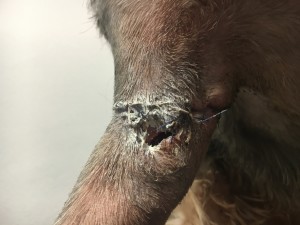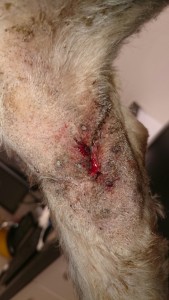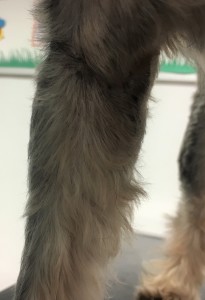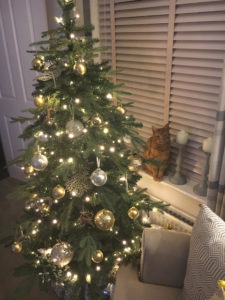Scooby is the most well behaved and tolerant little Schnauzer we have ever met! He came to us late one evening with an injury. Prior to that evening he had been a very well and happy boy.
On exam, Scooby had two large wounds underneath his right front leg. The wounds were deep creating two pockets of space and the the tissue underneath the skin had been torn at different angles. Although Scooby was extremely brave and allowed us to examine the wound he required sedation to clip, clean and fully assess the extent of the damage. Luckily, the rest of his clinical exam was fine.
The surrounding hair was clipped and the wound was flushed copiously with sterile water. This is to ensure any debris was washed out of the wound. The injury was the result of a dog bite so would automatically be classified as ‘contaminated’. As you can see, the holes created space within the tissues and there were different layers of damage but luckily no other important structures were damaged.
Next, we had to make some decisions about how we were going to manage this wound. This had to be done taking into account some potential risks and complications:
- Closing a contaminated wound via surgery can close dirt and bacteria inside. If surgery is performed some drainage must be provided. A special drainage tube can be placed at the time of surgery or part of the wound can be left open.
- Wound healing relies on the tissue being kept as still as possible. Too much movement will delay the healing process. Unfortunately, Scooby’s wound was in a place that would be very difficult to immobilize.
- Wound healing relies on minimal tension on the wound. If there are abnormal forces or pulls on the tissue then this again will delay healing. Given the location and the directions the tissues were torn in, this wound could definitely be at risk of tension under surgical closure.
In cases where we have such worries it is better not to rush into a surgery. Instead, the wound can be managed ‘open’ for a couple of days. This allows for re-assessment and ensures we make the best decision for that particular injury. It involves leaving the wound exactly as it is but providing pain relief, antibiotics, strict rest and a buster collar to prevent patient interference! Wounds can in fact be managed completely in this way.
This is not to say surgical closure was not an option. However, inappropriate closure could ultimately result in breakdown of the wound resulting in a wound even more difficult to close. Additional surgeries could be required or open wound management may then be the only option. This not only increases the time it takes for full healing but also increases costs too. In which case, open wound management can play a really important role in early wound management. With any luck, Scooby might not need a surgery at all, but if he did, at least it would be a smaller surgery with a more predictable outcome.
When we leave a wound open the body starts the natural healing process. The wound edges themselves contract and the space left by the injury will eventually close down as the tissues all knit back together. New tissue growth then starts from the sides inwards and bottom upwards. Wounds can heal completely in this way but as you can appreciate this takes time. Within the first week or so Scooby’s wound started to contract and improve.
 We elected to persevere with our open management. However, before the tissues contracted too much we wanted to try to oppose the tissues back together slightly; by closing the gap this would reduce some of the space to be filled and in turn help speed up healing time. We did this by placing four very loose stitches. As this was still a ‘contaminated’ wound we still left a small hole for drainage. We also started applying barrier cream around the wound to prevent painful ulcerated skin around the drainage hole.
We elected to persevere with our open management. However, before the tissues contracted too much we wanted to try to oppose the tissues back together slightly; by closing the gap this would reduce some of the space to be filled and in turn help speed up healing time. We did this by placing four very loose stitches. As this was still a ‘contaminated’ wound we still left a small hole for drainage. We also started applying barrier cream around the wound to prevent painful ulcerated skin around the drainage hole.
Given more time and TLC the wound began to completely heal. We stopped the pain relief and antibiotics after a couple of weeks and in just less than 8 weeks the wound had completely filled in and his hair was growing back! We couldn’t have asked for a better behaved patient and he definitely deserves our ‘Brave pet of the month’ for coping with this wound!


 It’s the season to decorate our homes and eat lots of festive foods! We find a lot of our clients already know which common Christmas foods and potential Christmas hazards our pet’s should avoid. However, if you are unsure of the potential toxicities associated with the festive season then The Veterinary Poisons Information Service (VPIS) provide some topical advice leaflets which we think are really useful.
It’s the season to decorate our homes and eat lots of festive foods! We find a lot of our clients already know which common Christmas foods and potential Christmas hazards our pet’s should avoid. However, if you are unsure of the potential toxicities associated with the festive season then The Veterinary Poisons Information Service (VPIS) provide some topical advice leaflets which we think are really useful.


